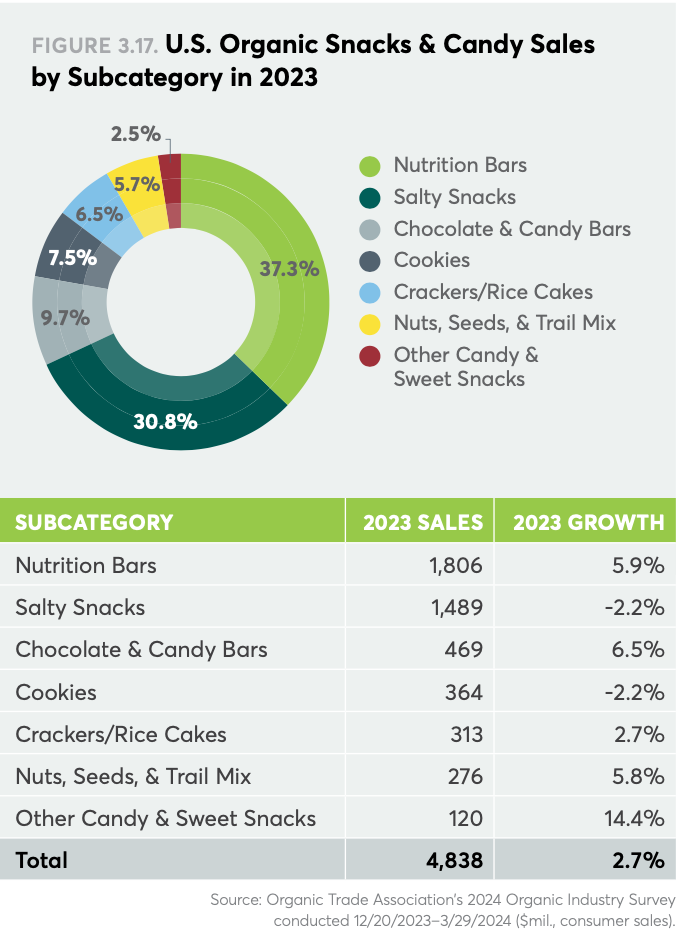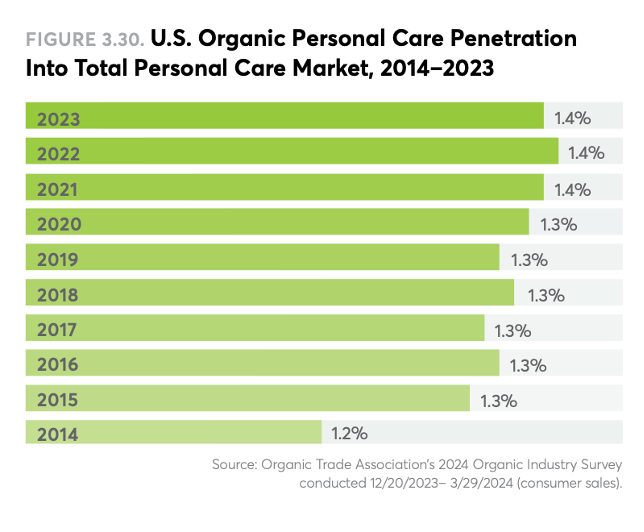Social media has consistently promoted organic products, connecting consumers with the benefits of organic living. The impact of social media on all our daily lives is deep, and deepest with younger consumers. These younger consumers are today’s most important organic buyers, and their likes and dislikes are increasingly shaped by social media.
New findings by the Organic Trade Association highlight the pivotal role that younger generations – especially the young adults in the up-and-coming Gen Z group – are having in transforming consumer trends. Their preferences are influencing the market, particularly in organic purchases, and those preferences are frequently sparked by trends that start on social media platforms.

Younger consumers are driving a host of emerging trends in which organic plays a significant role -- the rise of whole food snacks linked to the term ‘Girl dinner’ and ‘household ingredients’, the popularity of cherry juice mocktails for better sleep, and the growing demand for sustainable personal care products. A major catalyst for these trends is the social media platform TikTok. Even though TikTok was launched only in 2016, it’s been lightning-quick at attracting users and currently features among the most popular social media platforms in the world.
Viral marketing and trend creation
TikTok's unique algorithm and user engagement features have made it fertile ground for viral marketing. The platform’s ability to catapult obscure products and ideas into the spotlight almost overnight is unparalleled. Many of the health and wellness trends favored by young consumers have gained traction through viral TikTok videos. Users frequently share tips and hacks that align with their values, such as whole food snacks and cherry juice for better sleep, often leading to sudden spikes in demand.
Whole food snacks and the "Girl dinner" phenomenon
Snacks represent almost 7 percent of all organic product sales, with a penetration rate of nearly 5 percent into the overall snack and candy market, according to OTA’s 2024 Organic Industry Survey.
The rise of whole food snacks is linked to popular social media trends such as "Girl dinner" and the concept of "ingredient households." These trends reflect a movement towards simplicity and health consciousness in eating habits. "Girl dinner" -- creating meals from an array of whole food snacks like fruits, nuts, cheese, crackers, and vegetables -- is a trend that has gained significant traction on platforms like TikTok. This trend is often portrayed as an informal, easy-to-prepare meal option that focuses on balance, nutrition, and convenience. Learn more about the ‘Girl dinner’ trend and explanation.
"Girl dinner" resonates with many because it breaks away from traditional meal structures and embraces the idea of snacking as a legitimate meal format. It emphasizes the joy of eating what one enjoys without the constraints of formal meal planning, highlighting a preference for nutritious and easily accessible food options. This approach aligns with the broader trend of "ingredient households," where consumers stock up on basic, versatile ingredients rather than pre-packaged foods, allowing for more control over their diets and a focus on quality ingredients.
Organic fresh fruits and veggies are a big part of the “Girl dinner,” and in 2023, organic produce sales grew by 2.6 percent to $20.5 billion. Organic produce now accounts for over 15 percent of total U.S. fruit and vegetable sales. The concept of "girl dinner" has further popularized the consumption of healthy snack options like organic nuts, seeds and trail mixes, as it encourages people to curate their plates with diverse and wholesome ingredients.
Cherry juice and the "sleepy time mocktail"
Another noteworthy trend is the increasing popularity of cherry juice, often marketed as a key ingredient in "sleepy time mocktails." These beverages are crafted to promote relaxation and better sleep, capitalizing on the natural sleep-enhancing properties of cherries, which are rich in melatonin. The growing awareness of the importance of sleep for overall health is driving this trend, with consumers seeking natural and enjoyable ways to improve their nighttime routines.
This shift reflects a broader consumer preference for health benefits along with convenience, as seen in the increasing sales of functional beverages. For instance, juice bases like cherry juice have gained popularity not only for their sleep-enhancing properties but also for their post-workout benefits. These trends underscore the broader movement towards beverages that offer specific health benefits, such as anti-inflammatory and adaptogenic effects from ingredients like turmeric and ashwagandha. Again, organic products reflect this shift, with organic beverage sales in 2023 up almost 4 percent to a new record of over $9 billion.
Consumers turned to the latter seeking healthier alternatives to conventional sugar- and artificial flavor-filled drinks. Last year also saw a surge in new organic non-alcoholic beverages and mocktails
Overall, the demand for functional and health-enhancing beverages is reshaping the organic beverages market, highlighting consumer interest in products that support their wellness goals in natural and convenient ways. This trend is exemplified by the viral success of TikTok influencer @Olivianoceda's Cherry and Thyme Ranch Water mocktail, which has garnered over 9.6 million views, 1.2 million likes, and 27.9k shares along with her Midnight Cherry Mix.
Sustainable personal care products
The demand for healthy and sustainable personal care products is also on the rise, reflecting a broader commitment to wellness extending beyond diet. Organic personal care experienced robust growth in 2023 with sales increasing almost 7 percent to $1.3 billion. Trends in this category are largely driven by social media and focus on clean, single or limited-ingredient products.
Consumers are increasingly seeking products that are not only good for their bodies but also environmentally friendly. For instance, the hashtag #cleanbeauty on Instagram or TikTok showcases celebrities like Ashley Tisdale swapping traditional makeup brands for clean and organic options like Ilia makeup.
This shift in consumer choices is driven by a heightened awareness -- largely driven by well-known celebrities on social media -- of the impact of personal care products on health and the environment. Brands are responding by developing products with natural, organic ingredients and sustainable packaging, appealing to consumers' growing preference for eco-conscious and health-conscious choices.
Conclusion 
Gen Z's influence is reshaping the consumer landscape, driving trends towards healthier, simpler, and more sustainable choices such as organic, and social media plays a major part in communicating the ‘how to’ ‘why to’. Their preferences are setting new standards for the market. Research shows younger shoppers valuing sustainability and the environment over price, and actively seeking out the USDA Organic seal at the grocery store. These trends continue to gain traction, powered by influential platforms like TikTok. The organic sector is well-positioned and eager to meet the evolving needs of this conscientious generation.

